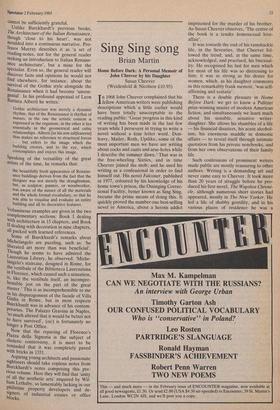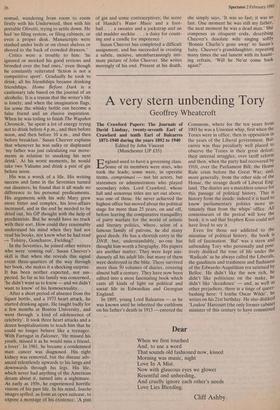Sing Sing song
Brian Martin
Home Before Dark: A Personal Memoir of John Cheever by his Daughter Susan Cheever (Weidenfeld & Nicolson £10.95)
In 1968 John Cheever complained that his fellow American writers were publishing descriptions which a little earlier would have been totally unacceptable to the reading public: 'Great progress in this kind of writing has been made in the last few years while I persevere in trying to write a novel without a four letter word. Don- leavy, Mailer, Roth, Updike, some of the most important men we have are yvriting about cocks and cunts and arse-holes while I describe the summer dawn.' That was in the free-wheeling Sixties, and in time Cheever joined the mob; and he used his writing as a confessional in order to find himself out. His novel Falconer, published in 1977, coloured by his knowledge of his home town's prison, the Ossinging Correc- tional Facility, better known as Sing Sing, became the prime means of doing this. It quickly proved the number one best-selling novel in America, about a heroin addict
imprisoned for the murder of his brother. As Susan Cheever observes, The centre of the book is a tender homosexual love- affair'.
It was towards the end of his ramshackle life, in the Seventies, that Cheever fol- lowed the trend, and, at the same time, acknowledged, and practised, his bisexual- ity. He recognised his lust for men which for most of his life was so distressing to him; it was as strong as his desire for women, which, as his daughter comments in this remarkably frank memoir, 'was self- affirming and ecstatic'.
There is a double pleasure in Home Before Dark: we get to know a Pulitzer
prize-winning master of modern American fiction, and simultaneously we learn much about his sensible, sensitive writer- daughter. She allows his shambles of a life — his financial disasters, his acute alcohol- ism, his enormous muddle in domestic affairs — to reveal itself through intimate quotation from his private notebooks, and from her own observations of their family life.
Such confessions of prominent writers made public are mostly reassuring to other authors. Writing is a demanding art and never came easy to Cheever. It took more than 20 years of struggle before he pro-
duced his first novel, The Wapshot Chroni- cle, although numerous short stories had appeared, mostly in The New Yorker. He led a life of shabby gentility, and in his various places of residence he was a
nomad, wandering from room to room firstly with his Underwood, then with his portable Olivetti, trying to settle down. He had `no filing system, or filing cabinets, or even a proper desk. Manuscripts were stashed under beds or on closet shelves or shoved to the back of crowded drawers.'
Critics were a trouble to him: 'he ignored or mocked his good reviews and brooded over the bad ones,' even though he constantly reiterated 'fiction is not a competitive sport'. Gradually he took to drink; all his friendships became drinking friendships. Home Before Dark is a cautionary tale based on the journal of an alcoholic. It is a truism that the writer's life is lonely; and when the imagination flags, for some the whisky bottle can become a false friend and an elusive inspiration. When he was toiling to finish The Wapshot Chronicle, 'he spent a lot of energy trying not to drink before 4 p.m., and then before noon, and then before 10 a.m., and then before breakfast.' Susan Cheever explains that whenever he was sulky or displeased 'my father was just calculating our move- ments in relation to sneaking his next drink'. At his worst moments, he would take two Valiums and drink a pint of gin before noon.
His was a wreck of a life. His writing success and fame in the Seventies turned out disasters; he found that it all made no difference to his personal predicaments. His arguments with his wife Mary grew more bitter and complex, his love-affairs increased, and in the end he needed to be dried out, his GP thought with the help of psychiatrists. But he would have no truck with their sort. How could they reasonably understand his mind when they had not read his books, nor knew what he had read — Tolstoy, Goncharov, Fielding?
In the Seventies, he joined other writers who were 'coming out'. Susan Cheever's skill is that when she reveals this signal event three-quarters of the way through her book, she makes it a shocking surprise. It has been neither expected, nor sus- pected. So far as his family was concerned, 'he didn't want us to know — and we didn't want to know' of his homosexuality.
After a short period of absence from the liquor bottle, and a 1973 heart attack, he started drinking again. He taught badly for a few months at Boston University, and went through 'a kind of adolescence of celebrity'. It took three heart attacks and a dozen hospitalisations to teach him that he could no longer behave like a teenager. With Farragut in Falconer, 'He missed his youth, missed it as he would miss a friend, a lover'. In 1981, he became a condemned man: cancer was diagnosed. His right kidney was removed, but the disease adv- anced relentlessly upwards to his lungs and downwards through his legs. His life, which never had anything of the American dream about it, turned into a nightmare. As early as 1956, he experienced horrific visions of his past life. In his mind, louche images spilled, as from an open suitcase, to expose a montage of his existence: 'A pint of gin and some contraceptives; the score of Handel's Water Music and a foot- ball . . . a sweater and a jockstrap and an old madder necktie . . . a daisy for count- ing and a candle for impotence.'
Susan Cheever has completed a difficult assignment, and has succeeded in creating a subtle, incisive, unembarrassingly inti- mate picture of John Cheever. She writes movingly of his end. Present at his death, she simply says, 'It was so fast; it was so fast. One moment he was still my father, the next moment he was a dead man.' She composes an eloquent coda, describing Cheever's desolate wife singing softly 'Bonnie Charlie's gone away' to Susan's baby. Cheever's granddaughter, repeating many times the sad lament with its haunt- ing refrain, 'Will he Ne'er come back again?'











































 Previous page
Previous page